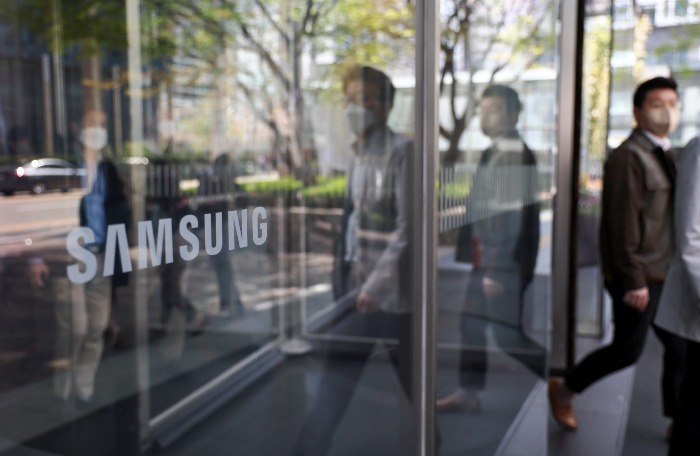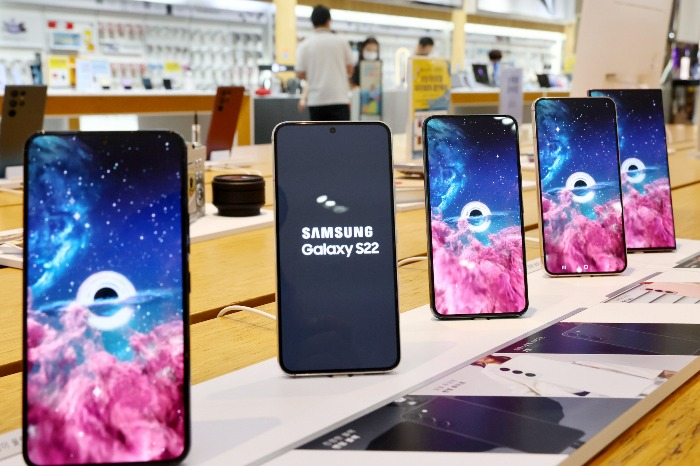Samsung Elec's Q2 earnings signal end of upward run
Prelim Q2 results show softer demand for consumer goods, despite rising chip shipments and forex gains
By Jul 07, 2022 (Gmt+09:00)
LG Chem to sell water filter business to Glenwood PE for $692 million


KT&G eyes overseas M&A after rejecting activist fund's offer


Mirae Asset to be named Korea Post’s core real estate fund operator


StockX in merger talks with Naver’s online reseller Kream


Meritz backs half of ex-manager’s $210 mn hedge fund



Samsung Electronics Co. on Thursday estimated that its second-quarter operating profit and sales edged down from three months before, reversing its record-setting revenue growth of the previous three quarters.
Accelerating inflation slammed the smartphone and TV divisions, shipments of which are estimated to have declined by double digits in the second quarter from the January-March quarter, analysts said.
The preliminary quarterly results are slightly better than analyst forecasts, bolstered by robust sales of semiconductor chips and increased translation gains from overseas sales.
But growing signs of a global recession indicate that pent-up demand is coming to an end as consumers are tightening their purse strings on the back of upward price pressure and higher borrowing costs.
Samsung's operating profit is estimated at 14 trillion won ($11 billion) in the April-June period on a consolidated basis, down 0.85% from a quarter before.
Sales inched down 1% on-quarter to 77 trillion won ($59 billion). Compared to the year-earlier period, its operating profit leapt 11.38%, with sales up 20.94%.
Despite the year-on-year growth in preliminary results, analysts said that rising prices in raw materials and logistics took a larger-than-expected toll on Samsung’s operating margins.
Samsung is expected to provide a breakdown of second-quarter results later this month, including profit margins.

Smartphone shipments at the world's largest smartphone maker are estimated to have dropped around 14% on-quarter to 60 million units in the April-June period. TV shipments are projected to have tumbled by 28% to 9 million units, according to analysts' consensus forecast.
MEMORY CHIPS, GAINS FROM WEAKER WON
By comparison, profits from NAND chips remained steady, with price rises offset by a reduction in shipment volume.
Foreign currency translation gains are projected to have climbed to 830 billion won in the second quarter, versus the 300 billion won gain in the first quarter.
The Korean won softened by 5% against the dollar in the second quarter from three months before and slid 12% from a year earlier, which boosted the value of overseas sales in terms of the won.
"The global economy has been cooling rapidly since the latter part of the second quarter, but Samsung's Q2 results seemed not to have reflected it," an analyst said.
"The macroeconomic factors will begin to weigh heavily on Samsung results from the second half."
In the current quarter, Samsung will likely continue to focus on lifting memory chip sale prices, rather than shipment growth, analysts said.
At the end of the second quarter, Samsung announced its mass production of 3-nanometer chips based on the industry’s smallest process node as a global first.
The latest chip model employs Samsung’s first-generation gate-all-around (GAA) transistor technology to produce high-performance and energy-efficient chips, which is expected to narrow its gap with foundry leader TSMC Co.
Shares in Samsung Electronics closed 3.19% higher at 58,200 won Thursday, against a 1.84% rise in the broader Kospi market.
(Updated with analyst comments and closing share prices)
Write to Ji-Eun Jeong at jeong@hankyung.com
Yeonhee Kim edited this article.
-
 EarningsSamsung’s 2022: Year of war on uncertainty, shaky supply chain
EarningsSamsung’s 2022: Year of war on uncertainty, shaky supply chainJan 27, 2022 (Gmt+09:00)
4 Min read


